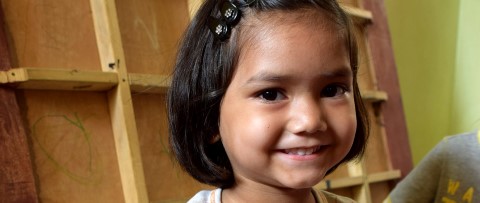
Kansas City, MO (July 15, 2015)
About 80 percent of brain development takes place by the time a child is 5, with the first three years seeing the maximum growth1. The early childhood period is a critical time that lays the foundation for lifelong learning. Although India is placing a growing focus on early childhood education, substantial numbers of children are still not enrolled in preschools. Impoverished families in particular struggle to find early education programs that are available to them.
With support from the Guru Krupa Foundation, Children International is helping to fill the early education gap in India. Hundreds of preschool-aged children are enrolled in Children International's Early Childhood Development (ECD) program, which enriches the lives of young children by ensuring opportunities for learning and growth. The ECD curriculum is focused on early mathematical skills, language development, hand-eye coordination and emotional and social development.
According to the World Health Organization, "The early child period is considered to be the most important developmental phase throughout the lifespan. Healthy early child development … strongly influences well-being, obesity/stunting, mental health, heart disease, competence in literacy and numeracy, criminality and economic participation throughout life. What happens to the child in the early years is critical for the child's developmental trajectory and life course." 3
Children International's ECD program helps get children on the right track for being successful in school by giving them a head start on English, math, art and music. Aflatot, a program that lays the foundation for social and financial literacy, is also incorporated into the curriculum. The Aflatot program helps children learn about spending, saving and sharing, in addition to helping children develop a positive sense of well-being and identity. Children in the ECD program also learn about the importance of good hygiene practices, like washing their hands, and are fed nutritious food to help enforce healthy eating habits. In addition to classroom education, children are able to visit places like nature parks and the zoo to learn about different things around them that are not part of their daily life.
A mother of one of the children in the ECD program said, "My daughter, Payal, comes home and recites poetry and her numbers. She can count the number of potatoes and tomatoes if I put them in front of her. This encourages me a lot, and my heart swells with pride. I know that she has a great future, especially when both my husband and I are uneducated."
This is the third consecutive year the Guru Krupa Foundation has provided funding for the ECD program in India. Mukund Padmanabhan from the Guru Krupa Foundation says, "Funding the Early Childhood Development program run by CI has been a very effective way to get involved in giving impoverished children in India a head start in school and in life, and we at GKF hope that this program will grow and serve thousands of children in the future."
3 http://www.who.int/social_determinants/themes/earlychilddevelopment/en/.
About Children International
Children International is a top-rated humanitarian organization focused on ending poverty by helping children and youth. Our local staff and volunteers deliver our holistic programs in health, education, empowerment and employment to over 300,000 kids through 70+ community centers in 10 countries.